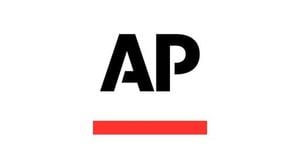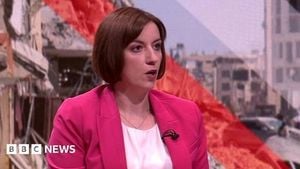In the corridors of British power, where the fate of the nation’s economy is debated and political fortunes can shift in a heartbeat, a surprising cast of characters has captured the public’s attention: the cats and dogs of Downing Street. Yet, as these four-legged residents continue to charm visitors and staff alike, the real drama is unfolding behind closed doors, where Chancellor of the Exchequer Rachel Reeves faces mounting pressure and a government reshuffle has sent shockwaves through Westminster.
On September 15, 2025, the UK’s financial outlook took center stage as concerns mounted that Reeves would need to find an additional £4 billion ($5.4 billion) to realign her budget. The catalyst? An impending decision by the Bank of England on whether to halt active gilt sales as it unwinds its crisis-era quantitative easing portfolio. The central bank’s announcement, expected on September 18 alongside its interest-rate decision, could spell further fiscal headaches for Reeves ahead of her crucial budget presentation scheduled for November 26, 2025, according to Bloomberg.
These developments come at a particularly sensitive time for Reeves. Just a day earlier, GB News hosts painted a bleak picture of Britain’s economy under her stewardship, with commentator Emma Woolf describing her as a “chancellor in name only.” Woolf didn’t mince words, branding Prime Minister Keir Starmer’s government “an absolute disaster” and accusing ministers of being more interested in “backstabbing” than addressing the country’s spiraling financial mess. As Woolf put it, “Running the economy, especially in the state it’s in now, is such a huge job that even a far more qualified and talented Chancellor would struggle to cope.”
The criticism reflects growing unrest within Labour’s ranks and the broader political establishment. Once considered one of Starmer’s closest allies, Reeves now finds herself increasingly sidelined as Number 10 recalibrates the center of economic decision-making. The government’s announcement that it is entering a “second phase” following a significant reshuffle has only underscored this shift, implying that the “first phase” of Starmer’s administration had not gone according to plan.
Central to this reshuffle is the arrival of Minouche Shafik as the Prime Minister’s new economic adviser, a move that has been widely interpreted as a public downgrade of Reeves’ status. Darren Jones, formerly the chief secretary to the Treasury, has been appointed to the newly created role of chief secretary to the prime minister, where he is charged with scrutinizing government spending and boosting operational efficiency. Other key changes include the replacement of Starmer’s principal private secretary, Nin Pandit, with Dan York-Smith, who previously oversaw tax and welfare policy at the Treasury. Number 10’s director of communications, James Lyons, is also departing, with Tim Allan, a former adviser to Tony Blair, stepping in as the government’s executive director of communications.
These moves are part of Starmer’s broader effort to reassert control over policymaking and address mounting criticism. Policy advisers are being shuffled and individual responsibilities redefined, all in a bid to steady the ship amid economic turbulence and political infighting. As GB News noted, government departments appear “at loggerheads,” with internal divisions threatening to undermine any coherent response to the ongoing crisis.
While the fate of the economy dominates headlines, another, softer side of Downing Street life has quietly endured through centuries of political turmoil: its resident cats and dogs. Sue Gray, the former chief of staff to Keir Starmer and once hailed as the most powerful woman in the country, recently gave her first interview since leaving No 10. The subject? Downing Street’s famous cats. Gray recounted how she adopted two rescue cats, Susie Gray and her brother, in the wake of her Partygate report in May 2022. “One has grey stripes and a white tummy and the other one’s just completely grey, stripey, and they are so alike, they love each other. Brother and sister. They sleep together. They argue a little bit, they play,” she told The Times.
Cats have been a fixture in Whitehall since the Tudor era, serving as both mousers and mascots. Larry the Cat, the current Chief Mouser at No 10, has become a national icon, recognized by 47% of the UK public according to a Deltapoll survey. Larry’s fame extends beyond Westminster: he’s met international leaders such as President Barack Obama and even pop stars like One Direction. “Larry gets more attention than all the rest of us put together,” Starmer acknowledged, recalling how foreign dignitaries are often more taken with the feline than with their political hosts.
Yet Larry’s popularity has not shielded him from controversy. Ian Murray MP, the former Scotland secretary, once called Larry “a little shit,” a remark that coincided with Murray’s departure in the recent reshuffle. Larry, on the other hand, remains firmly ensconced at No 10, outlasting many politicians. He’s had his share of close calls too—most notably when Angela Rayner, then deputy prime minister, narrowly avoided running him over while deputizing for Starmer at Prime Minister’s Questions. The incident went viral, with Rayner quipping to Starmer, “All under control here, boss!”
Starmer himself is a cat owner, with two felines—Jojo and Prince—residing in the No 10 flat. Prince, a white Siberian kitten, joined the family last summer, and according to Starmer, Jojo is particularly adept at keeping the mouse population in check. “Jojo is merciless with the mice. And so I think the message goes around in the mice world that ours is not a flat to pop up in,” Starmer joked, highlighting the practical benefits of feline company in Downing Street.
Dogs, too, have played their part in the life of No 10. Rishi Sunak, Starmer’s predecessor, owns a fox red labrador retriever named Nova. Sunak recounted how his daughter convinced him to get the dog with a meticulously prepared PowerPoint presentation, emphasizing the lessons in responsibility it would offer the family. Boris Johnson, meanwhile, was known for his exuberant dog Dilyn, whose feuds with Larry became the stuff of Westminster legend. “Larry very jealously guarded his territory,” Johnson recalled. “He’s very, very heavy and strong, and he scratched the life out of poor Dilyn.”
Larry’s enduring presence has made him a symbol of stability amid political upheaval. He still receives gifts and letters from the public, though any food is carefully vetted for safety. As one Downing Street insider told The Times, “Larry takes everything in his stride and knows exactly who’s boss. He will let you know very quickly when he’s had enough.” Despite his advancing age, Larry enjoys good health, with regular check-ups to ensure he remains fit for duty.
Even as speculation swirls about the future of the government, Larry’s position appears secure. Nigel Farage, a prominent political figure, has stated unequivocally that Larry would remain if he became prime minister, declaring, “Larry is more important than any politician or prime minister. Let’s get a sense of perspective here, please.”
In a world where political fortunes rise and fall with dizzying speed, the enduring presence of Downing Street’s cats and dogs offers a reminder that some traditions—and some personalities—are simply too beloved to be swept away by the tides of change.




